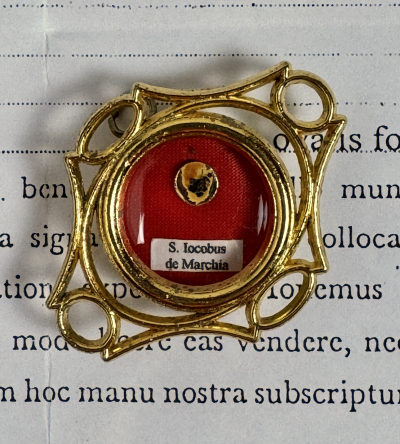Saint James of the Marches (Jacob de Marchia, Italian: Giacomo della Marca) (†1476) was an Italian Friar Minor, preacher and writer, Papal legate, and Inquisitor. He carried on his spiritual labors, remarkable for the miracles he performed and the numerous conversions he wrought. James preached penance, combated heretics, and was on legations in Germany, Austria, Sweden, Denmark, Bohemia, Poland, Hungary, and Bosnia. He was also appointed inquisitor against the Fraticelli, a heretic sect that dissented from the Franciscans on the vow of poverty, among other things. In 1432–33, he was sent by the Papal Council as an Inquisitor to Bosnia. He combated the heresies he found there, which earned him the hostility of its ruler, King Tvrtko II, and even more of his wife, Queen Dorothea, whom James accused of trying to poison him. James was buried in Naples in the Franciscan church of Santa Maria La Nova, where his body remained until 2001. At the instigation of the provincial minister (Franciscan superior) of the Marches region, Ferdinando Campana, James's body was relocated to Monteprandone, where it remains incorrupt and visible to the public today. He was beatified by Pope Urban VIII in 1624, and canonized by Pope Benedict XIII in 1726. Naples venerates him as one of its patron saints. His liturgical feast day is observed by the Franciscan Order on 28 November.
Round yellow-metal glass-fronted reliquary theca housing first-class ex ossibus (of the bone) relic of Saint James of the Marches. The relic is affixed to a red silk ground and identified in Latin on a typeset cedula label as S. Iocobus de Marchia (Saint James of the Marches). On the back, under a protective cap, the theca is secured with a seal of red Spanish wax bearing an imprint of a coat of arms of Monsignor Petrus Canisius van Lierde († 1995), the Vicar General for the Vatican City State (1951–1991). The reliquary is accompanied by the original matching authentics document issued by the Vicar General of Rome in 1990.
Дополнительная Информация
- ID#: 222-RSGSR
- Размер: 47 x 37 mm
- Возраст: около
- Происхождение: около
- Материалы: около
- Цена: $950
Дополнительные Фотографии

Level 60 Trading Co,, LLC
1089 Commonwealth Ave #314,
Boston, MA 02215, США
Tel: (+1) 786-206-9894
Наше местное время
Онлайн Магазин
Информация
Быстрые Ссылки

Level 60 Trading Co,, LLC
1089 Commonwealth Ave #314,
Boston, MA 02215, США
Tel: (+1) 786-206-9894
Наше местное время





 Change language to English
Change language to English